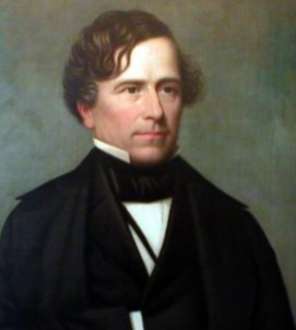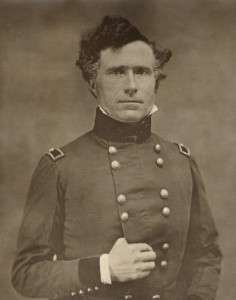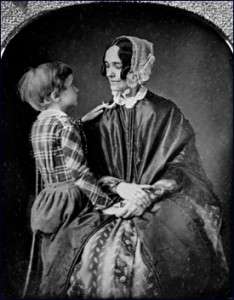Franklin Pierce was elected as the 14th and possibly worst president of the United States on Nov. 2, 1852. During his presidency he confronted two divided houses: the growing friction between the North and the South and his wife’s unhappiness with his political career.
His presidency began inauspiciously. Two months before he took the oath of office, President-elect Pierce and his wife lost their 11-year-old son, the third and last of their children to die. The Pierces took it hard.
Franklin Pierce
Handsome Frank Pierce was born in a log cabin on Nov. 23, 1804 in Hillsborough, N.H. His father, Benjamin, was a revolutionary war veteran who served as governor of New Hampshire.
Pierce first succeeded at law and then parlayed his charm, reputation and family connections into a political career.
He married Jane Means Appleton, the daughter of the president of Bowdoin College, Pierce’s alma mater. Their courtship lasted eight years and finally ended shortly after he won election to Congress. They held their wedding in 1834 at her family home in Amherst, N.H., and then left immediately afterward for Washington, D.C.
It wasn’t a great match. He was gregarious, vain, a drinker and a son of the frontier. She was shy, sickly, refined, a teetotaler and a proper daughter of New England’s theocracy.
Washington
Jane put up with his first session of Congress, but returned home to her mother in New Hampshire for the second. She had a reason: she was pregnant with their first child. Their son, Franklin Jr., was born in 1836, but he only lived a few days.
Jane Pierce managed another season in Washington. When her husband was elected to the Senate for the term beginning in 1837, she seemed less than thrilled.
Pierce succumbed to Jane’s wishes and quit the Senate in 1842. She had given birth to two more sons, Frank Robert in 1839 and Benjamin in 1841. Washington was no place to raise their children, she thought.

The Pierce Homestead, one of two presidential houses in New Hampshire where Franklin Pierce lived.
They moved to Concord, where Franklin pursued his legal career and dabbled in politics. He also managed to quit drinking for a while. But then their son Frank Robert died an agonizing death of typhus in 1843.
When the United States went to war with Mexico in 1846, Franklin Pierce accepted a commission as brigadier general. He returned from the war safely and as interested in politics as ever.
God’s Judgment?
In 1852, the Democratic Party nominated Franklin Pierce for the presidency of the United States. When Jane heard the news, she fainted. Their remaining son Benny wrote a letter to her saying, “I hope he won’t be elected.”
Franklin Pierce came to agree with that sentiment even before he took the oath of office.
Just after the election, Benny, 11, was crushed to death in a freak train accident. Wood fell on the boy’s head and Pierce picked him up, not realizing he was dead until he took off his cap. The boy’s head was like jelly.
Pierce never got over it. He didn’t take the oath of office on the Bible because he believed his son’s death to be God’s judgment for his political campaigning.
One-Term President
Franklin Pierce went to the White House as a doughface, a northerner with southern sympathies.
Two divisive decisions made him a one-term president. He signed the Kansas-Nebraska Act and supported the Ostend Manifesto, which justified the use of force in seizing Cuba. Both were ways to expand slavery. He also enforced the Fugitive Slave Act.

Franklin Pierce
When he ran for president in 1852, he didn’t have a campaign slogan. When it came time for re-election his opponents did: “Anybody but Pierce.”
Legend has it that as he left office he told reporters, “There is nothing left but to get drunk.” His reputation was destroyed, at least in the north, when he declared his support for the Confederacy. He was shunned for the rest of his life, though his friend Nathaniel Hawthorne stood by him.
Franklin Pierce died on Oct. 8, 1869, of cirrhosis of the liver.
If you enjoyed this story about Franklin Pierce, you may also want to read about his fight with Dorothea Dix over the mentally ill here. Or you might enjoy reading about Jane Pierce here, or about how Franklin Pierce discovered the body of Nathaniel Hawthorne here.
* * *
Now available in paperback. Click here to order it on Amazon.
This story was updated in 2023.
Image: Franklin Pierce Homestead By User:Magicpiano – Own work, CC BY-SA 4.0, https://commons.wikimedia.org/w/index.php?curid=20697770




22 comments
How sad 🙁
Scott Belliveau Stephen MacDonald
Years ago we went to the Franklin Pierce homestead in Hillsboro, NH and found it quite interesting.
That was very interesting, I never knew any of that. Very sad life.
Such a sad story.
[…] Revolutionary War veterans was held by Benjamin Pierce, a war hero and father of future president Franklin Pierce. Ammi Andrews of Ipswich, Mass., was the oldest at 89; the youngest was Nathaniel Johnson at […]
[…] of abolishing slavery. He participated in one famous debate with New Hampshire’s future president Franklin Pierce, and went on to challenge Pierce, a Democrat, in the 1852 presidential election as the nominee of […]
[…] Hannah Ropes made the most of the experience: She published a book, Six Months in Kansas: By A Lady, a collection of letters she wrote to her mother. She dedicated it to her own mother and blamed the conflict in Kansas on that ‘most unmitigated calamity Heaven ever suffered upon the earth–Franklin Pierce.' […]
[…] sight of a solitary black man walking through the busiest street in Boston was not soon forgotten. President Franklin Pierce had hoped that stern enforcement of the Fugitive Slave Law would quell opposition to it. He […]
A bio of Franklin Pierce without mention of Nathaniel Hawthorne omits a major element of the man’s life. That relationship seems to have been of greater importance to him than either his marriage or his political career.
Perhaps you’d be interested in this story: https://newenglandhistoricalsociety.com/franklin-pierce-discovers-the-body-of-nathaniel-hawthorne/
[…] the country. And she very nearly succeeded, were it not for New Hampshire’s only U.S. President Franklin Pierce and his insistence on catering to southern slaveowners above all […]
[…] Franklin Pierce was considered a dynamo when he was elected president in 1852. He was a popular speaker elected with more than half the vote, something no Democrat would do until 1932. […]
[…] of 1856, a radical physician from Massachusetts, Charles Robinson, was elected governor of Kansas. President Franklin Pierce declared him and others in his government to be revolutionaries and ordered their arrest. […]
Given his competition, Franklin Pierce can no longer be considered as one of the worst Presidents ever.
[…] In 1852, Nathaniel Hawthorne did the unthinkable: He wrote a campaign biography for presidential candidate Franklin Pierce. […]
[…] Hancock Inn became a favorite of another U.S. president, Franklin Pierce, when his friend state Sen. David Patten bought it in 1830. It has been run continuously as an […]
[…] Catholic Test became a major issue in the 1852 election of Franklin Pierce to the presidency. Pierce was a weak candidate from the start. It had taken 49 ballots at the […]
[…] of abolishing slavery. He participated in one famous debate with New Hampshire’s future president Franklin Pierce. He then went on to challenge Pierce, a Democrat, in the 1852 presidential election as the nominee […]
[…] of abolishing slavery. He participated in one famous debate with New Hampshire’s future president Franklin Pierce. He then went on to challenge Pierce, a Democrat, in the 1852 presidential election as the nominee […]
[…] In 1852, Nathaniel Hawthorne did the unthinkable: He wrote a campaign biography for presidential candidate Franklin Pierce. […]
[…] better to do. They had a son, Allen, and a daughter, Terry. Pierce claimed to be a descendant of President Franklin Pierce, though that would have been quite a feat. Franklin Pierce’s three children died before reaching […]
Comments are closed.